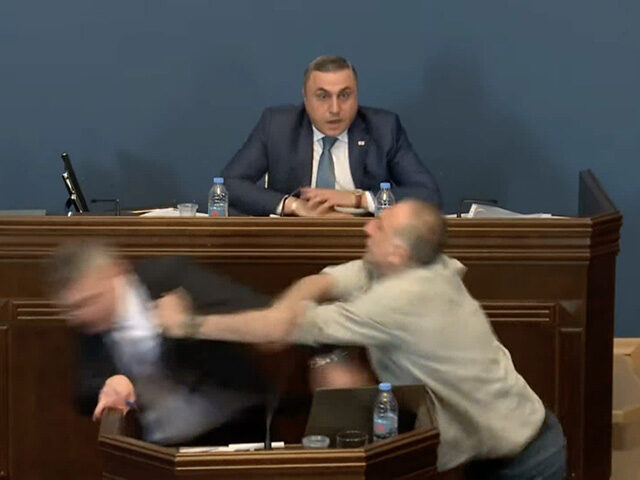A member of Parliament in Georgia triggered a large altercation on Monday after interrupting a fellow lawmaker’s speech by punching him in the face.
The attacker in question was identified as MP Aleko Elisashvili, a member of the opposition Citizens’ Party who reportedly assaulted ruling Georgian Dream MP Mamuka Mdinaradze during a parliamentary debate about a hotly contested bill that would require non-governmental organizations (NGOs) to register as foreign agents if they receive a certain amount of funding from abroad.
Mdinaradze was speaking in favor of the bill before the Parliament’s Legal Affairs Committee when Elisashvili punched him.
Watch video:
Following Elisashvili’s punch, a swarm of lawmakers approached the podium and began to fight, interrupting the legislative process. Elisashvili later declared that he committed the attack because Georgian Dream was “dragging us to Russia … we must drive them out.”
Straddling the borders of Europe and Asia, Georgia, a post-Soviet state, has experienced decades of political strife as dueling forces in the government attempt to bring Georgia closer to Europe or the Central Asia and Russia. The fight on Monday is far from the first fisticuffs in the Georgian Parliament prompted by disagreements over the “foreign agent” law, which the ruling party shelved last year and promised to return to debate “when emotions subside.”
The text of the legislation would require organizations operating in Georgia to register as foreign agents if they receive over 20 percent of their funding from foreign individuals or groups. The bill would also create a database of “foreign agent” groups. Supporters say that the bill offers transparency and would allow Georgian citizens to better judge the positions and activities of organizations if they know where the groups receive their money.
“Georgian society absolutely deserves to know which organizations are being financed, from which sources,” Georgian Dream Parliament member Givi Mikanadze said in an interview during the first round of debate on the law in 2023. “We are talking about transparency and having an obligation (to the Georgian people).”
Opponents, however, complain that the text of the law is alarmingly close to provisions in Russia that require organizations to register with the government. While an original version of the “foreign agent” law was implemented in Russia in 2012, strongman Vladimir Putin dramatically expanded the requirements for registration in 2022, a move opponents protested was intended to silence independent organizations that could potentially object to Putin’s policies.
Putin invaded Georgia in 2008, occupying the breakaway regions of South Ossetia and Abkhazia. Georgians, especially following the similar invasion of Ukraine in 2022, have repeatedly organized rallies and protests against the Russia-friendly Georgian Dream party calling for Tbilisi to move its policies closer to Europe and oppose Russian influence on their government. The alleged similarity of the “foreign agent” bill to Russian legislation triggered protests outside of Parliament featuring thousands of people in March 2023.
Watch video:
The Georgian Parliament also hosted a similar brawl while the protests were ongoing outside last year, featuring half a dozen lawmakers beating each other.
Clashes reported inside & outside Georgian parliament about proposed "foreign agents" legislation – to require organizations with 20+% funding from overseas to register as "foreign agents".
Law's protesters point out its similarity to 🇷🇺 "foreign agents" law. Dangerous trend. pic.twitter.com/O2GIS5GqPY
— Anton Gerashchenko (@Gerashchenko_en) March 6, 2023
Following the chaos, the Georgian Dream party issued a statement in March 2023 that it would “unconditionally withdraw” the controversial bill, accusing “the machine of lies” of scaring away popular support. Legal experts noted at the time that the Georgian Parliament’s rules do not actually allow the withdrawal of a bill – a bill must lose a vote to be vacated.
Georgian Dream indeed promised to “better explain” the bill “when emotions subside.”
Apparently gauging emotions sufficiently subsided, the Georgian government revived the bill in April, triggering immediate outrage and objection from both protesters and organizations operating in the country. In a letter published on April 12, the international NGO Human Rights Watch joined five trade unions and labor groups in Georgia to object to the law on the grounds that it was not limited to foreign-funded NGOs but could potentially devastate unions in the country.
“The bill is a transparent attempt to control, stigmatize and limit the influence of independent media and civil society. We believe it would also do severe damage to workers’ rights,” the letter read. “Trade unions are considered NGOs under Georgian law and would thus be affected by the bill if they receive more than 20% of their funding from foreign sources.”
“The government’s goals also clearly include crushing independent trade unions, which have been instrumental in sounding the alarm about Georgia’s dismal wages, poor record on worker safety, union busting and more,” the parties asserted.
Outside of Parliament on Monday, protesters against encircled the legislative chambers. According to Reuters, the crowd outside the Parliament attracted over 5,000 people. Protesters chanted “Russians! Russians!” at police, demanding the withdrawal of the “foreign agent” law. Police confirmed the arrests of 14 people at the protests on Monday on charges of “violating public order, resisting law enforcement, and verbally abusing them,” according to the outlet Civil Georgia. Reports citing attorneys for those arrested claimed that the detainees faced police brutality, beaten while taken into custody.

COMMENTS
Please let us know if you're having issues with commenting.